Indonesian passport
| Indonesian passport | |
|---|---|
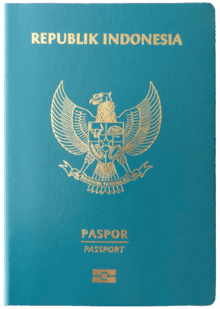 The front cover of the Indonesian biometric passport. | |
| Date first issued | 30 October 2014 (latest version)[1] |
| Issued by |
|
| Type of document | Passport |
| Purpose | Identification |
| Eligibility requirements | Indonesian citizen |
| Expiration | 5 years after issuance |
Indonesian passport is a travel document issued by the Government of Indonesia to Indonesian citizens residing in Indonesia or overseas. The main governing body with regards to the issuance of such passport(s), possession(s), withdrawal and related matters is the Directorate General of Immigration (Direktorat Jenderal Imigrasi) under Ministry of Law and Human Rights (Kementerian Hukum dan HAM Republik Indonesia) . Indonesia is one among many countries in the world that does not recognize dual citizenship for its citizens and such citizens will automatically lose her/his Indonesian citizenship if another citizenship is acquired voluntarily.[2] Special exceptions allow newly born citizens to hold dual nationalities (including Indonesian) until his/her eighteenth birthday after which a choice of either nationalities should be decided.[3] The latest Indonesian passports are bilingual: written in Indonesian and English.
The latest version of Indonesian passport was first announced on 30 October 2014.[4][5] Visible revisions include:
- Cover color: Prior to 30 October 2014, ordinary Indonesian passports were issued with a dark green cover while the latest one is turquoise green ('hijau tosca').
- Coat of arms: The coat of arms is now centered and significantly larger than older editions
- Translation (cover only): Only 'passport' appears bilingually (Indonesian above and English below) while the phrase 'Republik Indonesia' is not translated to 'Republic of Indonesia'.
- Bearer's signature: The latest version contains the bearer's signature on page 48. Previous versions contained the bearer's signature on page 3.
Types
Ordinary passports
According to Peraturan Pemerintah Nomor 31 Tahun 2013 (Government Regulation No. 31 of 2013),[6] ordinary passports consists of electronic and non-electronic versions.
Electronic Passport (E-passports) 
Effective from 26 January 2011, the Indonesian Directorate General of Immigration introduced ordinary electronic passports (e-passport) for Indonesian citizens. The initial launch quota was set at 10000 copies for the year 2011. Biometric passports were initially available only in three immigration offices: West Jakarta, Soekarno-Hatta, and Central Jakarta.[7][8][9] but availability has widened since the first quarter of 2014, with ordinary electronic passports being issued in all immigration office in Jakarta, Surabaya, and Batam. The electronic passports are available in 24 and 48 page versions (like non-biometric passports). The biometric chips are embedded within the back cover of the passports.
In 2011, approximately 12,000 Indonesian citizens obtained biometric passports and starting from the 25th of January 2012, Indonesian Immigration Authority launched computerized immigration gates in Soekarno Hatta International Airport, reducing queue time for biometric passport holders as they no longer need to check in manually at the immigration counter. The service is available both for arriving and departing passengers.[10] The government plans to install computerized gates in airports throughout the country.
As per second quarter of 2015, the electronic ordinary Indonesian passport is also issued in the latest version that is covered with bluish-green (tosca green) color.
Currently, Indonesian e-passport holders can enjoy visa-free travel to ![]() Japan for up to 15 days per stay (albeit still requiring a visa waiver endorsement certificate to be issued at Japanese embassy prior to travel). Non-electronic passport holders do not enjoy this privilege and must have a visa whenever they want to travel to Japan.
Japan for up to 15 days per stay (albeit still requiring a visa waiver endorsement certificate to be issued at Japanese embassy prior to travel). Non-electronic passport holders do not enjoy this privilege and must have a visa whenever they want to travel to Japan.
Visa-free privileges of other countries for Indonesian passport holders are currently valid for both passport types.
Diplomatic passports (Paspor Diplomatik)
Issued by Ministry of Foreign Affairs for Indonesian subject(s) who is serving as diplomat and/or government person[11] in order to travel for diplomatic purpose(s). Such passport also covers the immediate family that would travel along with the main passport holder. Holding an Indonesian diplomatic passport does not guarantee a 'diplomatic immunity' to its bearer [12] although those who gain 'diplomatic immunity' might be holding such passport. Holding such passport does not also entitle the bearer to travel with the passport for non-diplomatic mission. Appropriate 'non-diplomatic' visa or entry clearance should be obtained prior to travel to the destined country. The latest version of Indonesian diplomatic passport is issued in black colored-cover.
Service passports (Paspor Dinas)
Issued by Ministry of Foreign Affairs for Indonesian subject(s) who is serving as public servant on official travel. This type of passport is also issued to the immediate family member of the main passport bearer.[13]
Hajj passports (obsolete)
The Ministry of Religious Affairs formerly issued hajj passports for the hajj pilgrimage to Mecca under Article 29(1)(d) and Article 33 of the Immigration Act of 1992. However, new government regulations in 2009 deleted the relevant portions of the legislation.[14] As of Hajj 2009, all hajj pilgrims from Indonesia use ordinary passports. The use of ordinary passports is a requirement of the Saudi Arabian government.[15]
Passport Note


The passports contain a note from the issuing state that is addressed to the authorities of all other states, identifying the bearer as a citizen of that state and requesting that he or she be allowed to pass and be treated according to international norms. The note is found on the first page of the passport, which is on the other side of the identity page. The note inside the latest version of Indonesian passports states:
In Indonesian:
Pemerintah Republik Indonesia memohon kepada semua pihak yang berkepentingan untuk mengizinkan kepada pemegang paspor ini berlalu secara leluasa dan memberikan bantuan dan perlindungan kepadanya.
Paspor ini berlaku untuk seluruh negara dan wilayah kecuali ditentukan lain
In English:
The Government of the Republic of Indonesia requests to all whom it may concern to allow the bearer to pass freely without let or hindrance and afford him/her such assistance and protection.
This passport is valid for all countries and areas unless otherwise endorsed
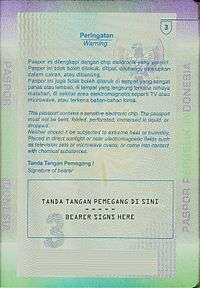


In case of diplomatic and service passports, those are not formally valid for visits to Israel [16] and Taiwan,[17] since there are no formal diplomatic ties with those countries, requiring diplomats and servicemens to use regular passports and to obtain appropriate visa or entry clearance from the immigration authority of the destined countries.
There is slight difference as appears on page number three (3), which is immediately next to the identity page, between the ordinary non-electronic passport and the electronic version. The ordinary non-electronic passport depicts signatures of both the bearer of the passport and the issuing authority, both are manually done at the immigration office during the interview by the immigration officer. Official later stamp of the corresponding issuing authority logo on the same page with the signatures.
The ordinary electronic passport no longer bears the signature of the issuing authority as such information has been embedded in the digital information system, thus only bearing the signature of the passport holder.[18] However, the signature of the bearer is still manually done during the interview by the immigration officer although digital signature of the holder is also included in the digital information embedded on the electronic chip along with the ten-fingerprints and digital face photograph. Above the signature, reminder of the inclusion of the chip on the passport can be found requesting appropriate treatment of the passport to avoid chip disturbance as such passport should not be bent and/or exposed to extreme radioactivity devices.
Third page of the latest (2014) version of Indonesian ordinary passport (both electronic and non-electronic versions) contains 'warning' (Indonesian=Peringatan) that would typically be printed on the interior side of the back cover of its predecessor version.[19]
Identity information page
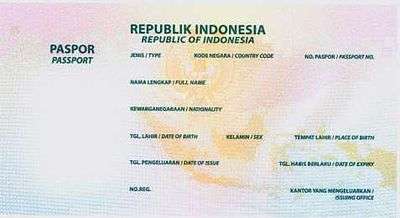
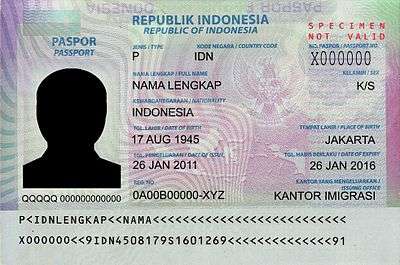
- Photograph
- Type (P - passport)
- Country code (IDN)
- Passport number
- Sex
- Nationality (INDONESIA)
- Date of birth
- Place of birth
- Date of issue
- Date of expiry
- Registration number
- Issuing office
- Machine readable zone
Visa requirements
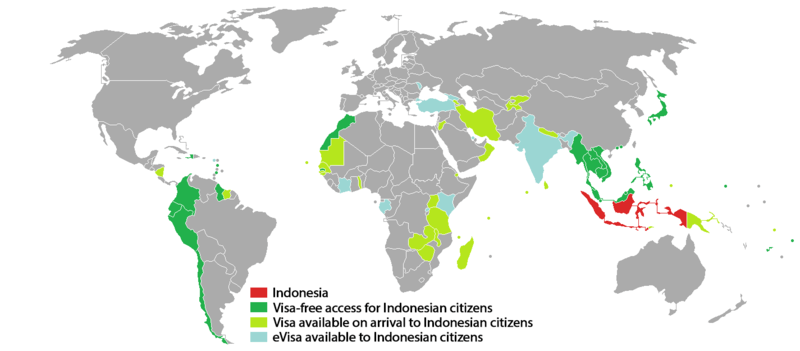
In 2016, Indonesian citizens had visa-free or visa on arrival access to 58 countries and territories, ranking the Indonesian passport 79th in the world according to the Visa Restrictions Index.
Passport fees
As of July 2014, Indonesian passport fees (inclusive of service charges) are:[20]
| Passport type | Price in Indonesian rupiah |
|---|---|
| Regular passport (24 pages) | 155,000 (US$15) |
| Regular passport (48 pages) | 355,000 (US$35) |
| Electronic passport (24 pages) | 405,000 (US$41) |
| Electronic passport (48 pages) | 655,000 (US$65) |
Note: The fees above has included Biometric service fee (IDR 55,000).
For online registration (only for non-electronic ordinary passports) with payment through Bank BNI, additional charge of (IDR 5,000) is also applied.
Recent changes and future arrangement (2013-2014)
Effective from 1 October 2013, The Indonesian Directorate General of Immigration replaced the previous version of diplomatic and service passports with the current version in order to maintain a high security precaution and to fulfill the International Civil Aviation Organization standard.[21]
In January 2014, Indonesian Ministry of Law and Human Rights announced a future design of ordinary Indonesian passport, coinciding the 64th anniversary of the Indonesian Directorate General of Immigration. The main difference would be the material of the page bearing holder's identity. The new version will use polycarbonate instead of laminated paper. Ministry of Law and Human Rights Amir Syamsudin stated that the on-working change is expected to reduce passport forgery. Another difference is the design of passport holder's photograph. In the upcoming version, 3 photographs of the passport holder will be displayed using 3D technology, each on the left, middle and the right side of the page. The visa pages will be decorated using item(s) that describe Indonesian flora, fauna or culture. Although the official information has been released, there is currently no exact date of the implementation.[22]
See also
- Paspor Orang Asing
- Surat Perjalanan Laksana Paspor
- List of passports
- Visa requirements for Indonesian citizens
- Visa policy of Indonesia
External links
- Directorate General of Immigration of the Republic of Indonesia (English)
- Indonesian Paspor Online Service
References
- ↑ http://www.imigrasikarimun.com/2014/12/desain-baru-paspor-republik-indonesia/
- ↑ Law No 23 year 2006
- ↑ http://www.indonesianembassy.org.uk/consular/consular_wni_qa.html
- ↑ Here is the New Indonesian Passport Design
- ↑ http://www.imigrasikarimun.com/2014/12/desain-baru-paspor-republik-indonesia/
- ↑ PP No 31 year 2013
- ↑ http://www.imigrasi.go.id/index.php?option=com_content&task=view&id=440&Itemid=1
- ↑ Indonesian E-Passport Launched at January 26th 2011
- ↑ http://english.kompas.com/read/2011/01/26/16405468/Indonesia.Launches.E.Passport
- ↑ http://www.imigrasi.go.id/index.php?option=com_content&task=view&id=690&Itemid=175
- ↑ http://www.kbri-astana.kz/id/pelayanan_wni_dan_bhi-64%7C69%7C73.html
- ↑ http://www.kbri-astana.kz/id/pelayanan_wni_dan_bhi-64%7C69%7C73.html
- ↑ http://www.kbri-astana.kz/id/pelayanan_wni_dan_bhi-64%7C69%7C73.html
- ↑ Peraturan Pemerintah Pengganti Undang-Undang Republik Indonesia Nomor 3 Tahun 1999 Tentang Perubahan Atas Undang-Undang Nomor 9 Tahun 1992 Tentan Keimigrasian, Board of Supervisors of Finance and Development (Badan Pengawasan Keuangan dan Pembangunan), retrieved 2011-11-14
- ↑ Lutfia, Ismira (2009-07-03), "Hajj Pilgrims Must Now Have Regular Passports", The Jakarta Globe, retrieved 2011-11-14
- ↑ http://www.timesofisrael.com/indonesia-to-informally-upgrade-its-relations-with-israel-via-ambassador-ranked-diplomat-in-ramallah/
- ↑ http://www.thejakartapost.com/news/2012/10/03/indonesia-taiwan-ties-when-gray-good.html
- ↑ http://www.imigrasi.go.id/index.php/en/berita/berita-utama/205-tingkatkan-efektivitas-pelayanan-paspor-imigrasi-terbitkan-paspor-tanpa-tanda-tangan-pejabat-yang-berwenang
- ↑ http://www.imigrasikarimun.com/2014/12/desain-baru-paspor-republik-indonesia/
- ↑ PP no 45 year 2014
- ↑ http://www.setkab.go.id/berita-10747-kemlu-terapkan-paspor-diplomatik-dan-dinas-dengan-desain-baru.html
- ↑ http://www.jpnn.com/read/2014/01/27/213253/Kemenkum-HAM-Kenalkan-Buku-Paspor-Baru-